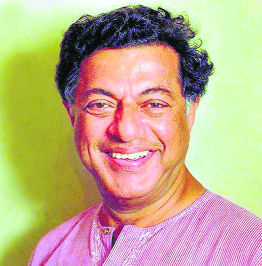Girish Karnad: A personal reminiscence
Keki Daruwalla
Personal reminiscences should be written by people close to the subject, not by the likes of me on chance meetings in the outer peripheries. I did not know Girish Karnad personally when I saw his play
Tughlaq about 40 or more years ago.
Arun Singh acted as Tughlaq and he had a booming voice. When he roared ‘main bhus bhar doonga’, it rang a bell. I remembered my medieval Indian history. Ghiyasuddin Tughlaq had not only got his Governor of Sindh executed, but also stuffed with straw or sawdust, for disobeying him. Decades later, I saw the play again. This time the stage was so big you could land an aircraft there. It covered the entire flank of the Purana Qila, and was absolutely mind-blowing in scale. Karnad never saw this production. The play was still going on, but he told me he had to meet many commitments.
The earliest memory I recall of him was when we both spoke at Bengaluru at a public function held in 1993 I think, to mourn AK Ramanujan — who had passed away in Chicago on the operating table, before the operation had started. It was an operation on the spine and Ramanujan was too scared. Ramanujan had talked to me about it six months earlier. The pain in his leg was excruciating and a spinal operation was essential. Ramanujan was a fine poet and translator. His role in projecting South Indian languages to the western world from his chair in Chicago University was phenomenal. UR Ananthamurthy had invited me to come. He, as an old friend of Ramanujan, of course spoke on the occasion. Later, Karnad and I ran into each other at events. The Bangalore Literary Festival was in honour of Ananthamurthy, a fine litterateur, best remembered for his Kannada novel Samskara, which Ramanujan translated into English and made famous. Karnad had written the screenplay for the film and acted in it. What luck for the novel! Here was a clutch of friends, all illustrious in their own way, backing a fine book.
Karnad’s many-sided personality could overawe people — one of India’s finest playwrights and screenplay writers and a fine actor, who wrote directed and acted. A multi-lingual litterateur, he was one of India’s great sons. In the arts you can hardly find a match.
He could be blunt, truth needs to be blunt. Too much sugar-coating can turn it smarmy. Someone at that Bengaluru fest called Ananthamurthy ‘a great writer’. Karnad sharply disagreed, though Anantha was a close and dear friend of his and an intellectual. But as a creative writer he had started and ended with one notable book, Samskara. Karnad employed the same bluntness when he stood up for artists and causes being trod underfoot by the overweening state. When the state commits a crime, there are no FIRs. When the state came down on the Kabir Kala Manch, a Dalit outfit set up in 2002 after the bloody Gujarat riots in which close to a thousand were killed (many were burnt alive), and the state jailed people of the Kala Manch, Karnad held a press conference in defence of the artists in Mumbai. (One needs to hear Sheetal Sathe sing a song on Govind Pansare, which she penned in prison.) He joined writers in an appeal to the voters to throw out hate politics before the recent elections. Recently, half a dozen intellectuals have been arraigned for planning to assassinate the Prime Minister!
In 2007, I postponed by two months an angioplasty for two reasons, a reading at Struga where Mahmoud Darwish was to get the wreath of honour, and an evening organised by Jasbir Jain at Rajasthan University where Karnad, Nayantara Sahgal, Mukul Kesavan and I were to speak. Karnad mentioned the Parsi theatre of yore, and I began my reading with some snippets from that era. The Parsi theatre was a mishmash of play and opera. He told me I should get that video recorded. I have not done that till today. It was a leisurely affair. We stayed at the University Guest house for the night and had long conversations.
In November 2017, we both were feted generously by the Tata Literature Live Festival and Anil Dharker at NCPA Mumbai — Karnad with the Lifetime Achievement Award, and I with the Poet Laureate Award which Vikram Seth had got in previous years. Karnad spoke at length on the topic, “Playing on Twenty Tongues.” He spoke about Konkani (his mother tongue), the language he studied in (Marathi), the language he loved and took him to Oxford (English) and the language he wrote his plays in — Kannada. What a versatile man!
I had a conversation with him on Warren Hastings — I broached the topic, what a great idea it would be to write a novel about his times. He said he always wanted to write a play on him! I know my history, taught by my father, Chait Singh, Begums of Avadh — all his excesses, the duel with Francis. And there was the other side to him, someone who had great respect for Indian scriptures, supported the first English translation of the Bhagavad Gita and wrote the introduction, supported Sir William Jones in founding the Asiatic Society of Bengal. Karnad said he wanted to write a play on him one day. I wanted to write a novel around him.
I asked the fine historian Mushir ul Hasan who told me there was just one full length book on Hastings written in the 1960s. To write on him today would mean studying the records of the East India Company. I am reminded of Ghalib. “Khaak ho jayenge hum, thum ko khabar hone thak.”









